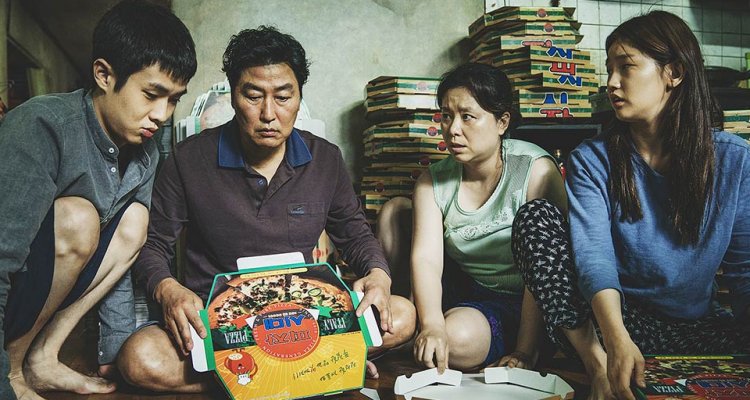“Spoiler” has become a buzzword in recent months, a consequence of the fervent anticipation for pop-cultural events on screens big and small. However, it’s a whole other thing for a Korean cinema export to receive the same gag-order treatment, but this is Bong Joon-Ho’s request for “Parasite,” the second Competition appearance for the South Korean helmer at the Cannes Film Festival. Unsurprisingly, the family-driven comedic thriller isn’t something that lives or dies on precipitous revelations. Rather, it’s a consistently entertaining film that takes up the stratification of Korean society as its target. A demented and often-uproarious class-conscious satire, “Parasite” falls slightly short of Bong’s greatest work.
READ MORE: 2019 Cannes Film Festival: The 21 Most Anticipated Movies
A type of bizarre, black comedy, “Parasite” introduces us to the impoverished Kim family, with patriarch Ki-taek (Song Kang-ho, iconic for his performances in “The Host” and “Snowpiercer“) at the head. Living in squalor, the clan struggles to get ahead in a ferociously competitive job market —folding pizza boxes is their current best bet of income. When son Ki-woo (Choi Woo-shik) catches wind of an English tutoring opportunity, his sister Ki-kung (Park So-dam) whips up a false university degree to get her brother in the door. As Ki-woo enters the Park household, “Parasite” enters the spoiler space of— let’s say creepy invasion and takeover with out there elements— and an outrageous sequence of events that cannot be walked back.
READ MORE: the 100 Most Anticipated Films Of 2019
The cast of “Parasite” is uniformly solid, keeping true to the heightened tone of a difficult-to-classify experience. Korean cinema icon Song has less heavy-lifting to do as one moving part in this large ensemble but still manages to leave a strong impression. His primary burden is a profound shame, with the weight of his relations’ economic circumstances and his failure as a breadwinner manifesting subtly in the actor’s stature.
READ MORE: Summer Movie Preview: 35 Films You Shouldn’t Miss
Across the board, characters lack a degree of nuance, often behaving in outrageous or contrived ways in order to arrive at an essential juncture in the plot. There’s nothing here in the order of Tilda Swinton’s performances in “Snowpiercer” and “Okja” here—let alone Jake Gyllenhaal’s living cartoon in the latter film—but caricatured portrayals hinder the expression of the film’s core values, which are at times muddy. Emotionally ambitious, “Parasite” shoots wide but comes up lacking at key crossroads.
READ MORE: The 25 Best Films Of 2019 We’ve Already Seen
Bong draws the two domestic spaces in stark relief. The home of the Parks is a modernist architectural marvel; we are repeatedly informed that its designer was also its former resident. The structure is an angular construction of concrete and wood with all the amenities. Sunlight beams in through enormous windows that open onto the meticulously maintained backyard, and unnaturally pruned trees isolate the dwelling from the wider world. The intricacy of the Park domicile also allows for inventive staging across multiple planes of action, transforming the space into a theater of hijinks.
Conversely, the semi-basement slum in which the Kims reside is run-down, practically falling apart. When a fogger truck passes by, Ki-taek directs his family to leave the windows open for the free fumigation. Throughout its run time, “Parasite” renders the lower class rung literal by associating the most vulnerable people with subterranean spaces. Of course, Bong has shown a predilection for telling his stories through the perspective of impoverishing protagonists and their displacement, most literally in the train-car hierarchy of “Snowpiercer.” It’s a preoccupation that sets Bong apart from the glamor of Korean cinema and other hallyu.
The prominence of cell phones and other technological markers heightens the modern vibe of “Parasite.” The centrality of technology is established from the opening scene, as siblings, Ki-Woo and Ki-jung scramble to pick up a Wi-Fi signal in their partially subterranean home. Smartphones are employed as a waypoint for subterfuge and deception, but above all, they are essential tools for the marginalized Kim family to remain plugged into society and keep their heads above water.
The dizzying of heights of unforgettable films like “Memories of Murder” and “Okja” are a bar that Bong Joon Ho isn’t quite able to clear with “Parasite,” as entertaining as it may be. Bong has a particular talent for making intimate stories pop on a blockbuster-sized canvas, and “Parasite” is no exception. Of course, “Parasite” is primed to be a monster hit in its country of origin. Some details may be lost in translation in the South Korean film, but there is nonetheless something universally relatable in the Kim family’s struggles with social status, and Bong’s sick sense of humor plays well. In a fickle economy, it’s one misstep that separates the Kims from the Parks—a reality that is clearly at the forefront of the filmmaker’s mind. [B]

